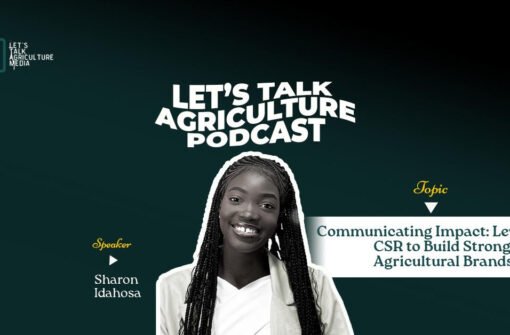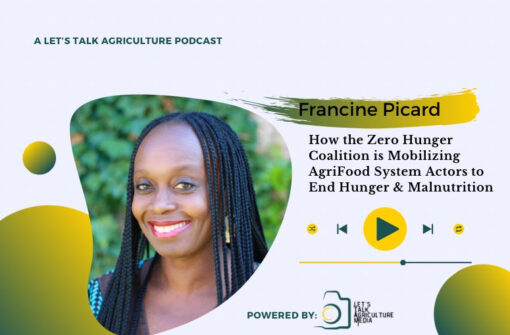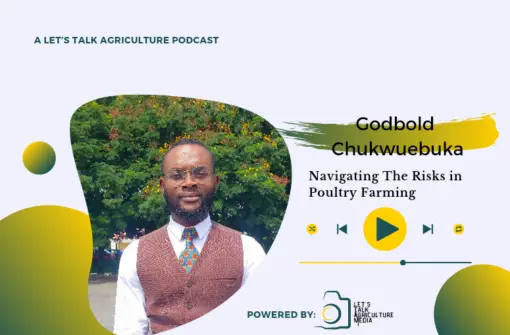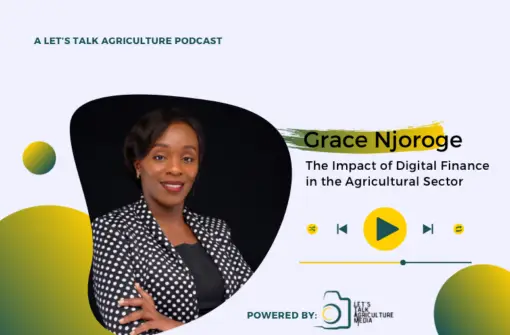Navigating the Risk In Poultry Farming
[00:00:00] Intro
[00:00:41] Sharon Idahosa: Hello, beautiful people. Welcome to the Let’s Talk Agriculture podcast show, where we share the happenings, the trends and the opportunities in the agriculture sector. Now in today’s episode, we will dive into poultry farming. A thriving business opportunity in Nigeria and, of course, across Africa. So while many [00:01:00] young people are super eager to jump into this lucrative field, it is crucial to understand some of the challenges that are involved, including the health issues, the And even mortality rates.
[00:01:14] Sharon Idahosa: So joining me today is Goldbold Chukwuebuka, a young entrepreneur who is excelling in the poultry industry and still experiencing the downside associated with poultry farming. Now we will uncover the essential knowledge every aspiring poultry farmer should have in order to succeed and sustain their business.
[00:01:36] Sharon Idahosa: Now, thank you so much for joining today, Chukwuemeka. I would really, really love to hear about your journey into the poetry, uh, into poetry farming. Please say hello to our guests, uh, audience rather. Thank you.
[00:01:49] Godbold Chukwuebuka: So, hello. By the way, my name is Godbold Chukwuebuka, not Chukwuemeka.
[00:01:53] Sharon Idahosa: Oh my, my apologies, my
[00:01:56] Godbold Chukwuebuka: apologies.
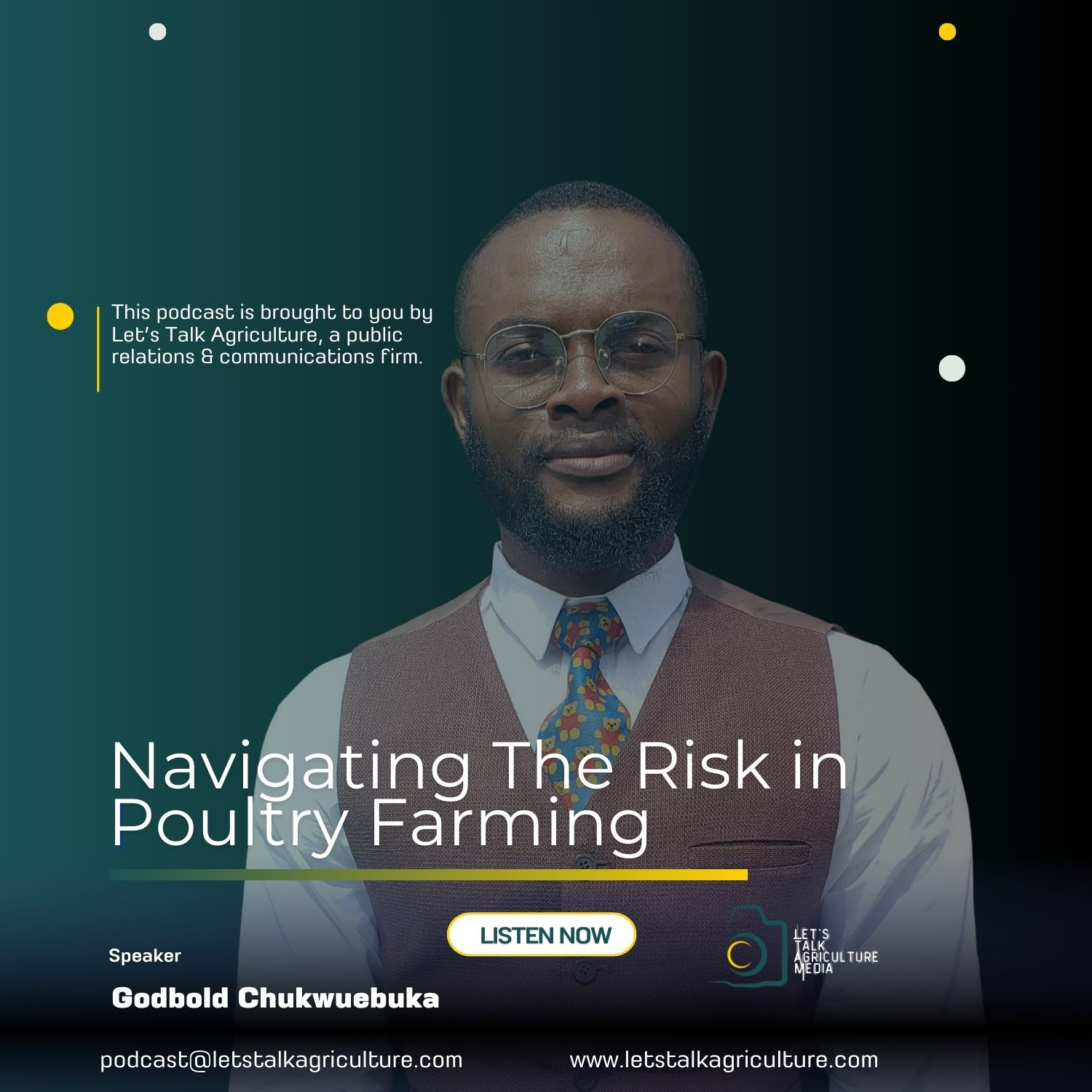
[00:01:57] Godbold Chukwuebuka: Godbold, Godbold, Godbold [00:02:00] Chukwemeka.
[00:02:04] Sharon Idahosa: Ah, thank you. And to think that I was actually singing with the name before and, and now I missed it. My apologies for
[00:02:13] Godbold Chukwuebuka: this. Thank you.
[00:02:14] Sharon Idahosa: It’s a pleasure to have you here. So please tell us your journey to go farming.
[00:02:18] Godbold Chukwuebuka: So basically, it all started while I was in university. That was my 300 level, about entering second semester, 3 11 20 18.
[00:02:27] Godbold Chukwuebuka: Entering about entering 400 level. So we had this program in our school then with Central Bank of Nigeria under CDC, Southeast Entrepreneurship Development Center. So they came to empower We the students, about entering year, they came to empower us based on agribusiness and management, because that was what I studied.
[00:02:46] Godbold Chukwuebuka: The school. I studied agribusiness and management. So it was a three month program, was a three month program. The. It’s going to go aspect of it is a second one to the practical aspect of it and the third month was business plan you get to present your [00:03:00] business plan then you are ready to see. So basically what inspired me to enter into poultry farming, when I saw doing the practical aspect of it, I enrolled into poultry farming, I don’t know, I don’t just understand I don’t know what made me to enter into poultry farming, but I just enrolled into poultry farming.
[00:03:15] Godbold Chukwuebuka: And it was quite very interesting. At first, at first, what I, the first thing I learned there was just the Bikini Hen. because then we’re on two layers. So I was so inspired by how it was, how it went so smoothly, how we were able to debate these terms. And I wanted to know more about this stuff. I wanted to know more about this poetry farming.
[00:03:36] Godbold Chukwuebuka: That was how everything started. So I started my journey researching, studying about poetry farming. Now poetry farming is not just Something you just, you just enter, just let that know you have to acquire more money, you have to have mentors. So I basically that basically that was what inspired me to project for me now, that, that essence of the, it was so fun.
[00:03:54] Godbold Chukwuebuka: It was so fun. Like taking care of animal, even to a point of de more like as a human being, you’re [00:04:00] trying to trim your nail, your, your names and your fingers. But this, for this aspect, you’re trying to Deb, their big, to actually trim their beat, to avoid them kindal on each other. So it was so fun. So I just, I wanted to know more about this stuff.
[00:04:13] Godbold Chukwuebuka: I started studying about poultry farming, reading about poultry farming. I think that was my project, my final year project. So, from there on, that was how it started. So, during my NYSC, I wanted to go into poultry farming fully. So, by a special grace of God, I was by saving love. I was by saving love, and I started with Federal Ministry of Agriculture and Rural Development in Abuja here.
[00:04:33] Godbold Chukwuebuka: So, that was how I started my poultry farming. It made a lot of sense to me. I entered into portal farming and since then, it has been fun. Um, but especially I’ve been privileged to educate some rural portal farmers in my area, my community, and the result, the outcome of the education have been awesome. So the journey has been smoothly, the journey has been going so, so well.
[00:04:52] Godbold Chukwuebuka: That’s just the aspect, that’s just the motivation, it’s just, I saw, I was being, I saw myself debugging a hen, which was, it was quite [00:05:00] rare, I would like to be debugging a hen, which so, it’s so nurtured and very caring. So I wanted to know more about this stuff, I wanted to know more about how Ruby is caring for animals this way.
[00:05:10] Godbold Chukwuebuka: So that was how the journey, see you next time. I’m into poultry farming and it’s going so well, I say poultry farmer. Thank you.
[00:05:16] Sharon Idahosa: Well, that’s really quite a motivation if you ask me. I mean, I also studied agriculture, you know. And the first time I went into, uh, what’s it called now? Should I, let me just call it the farm because Okay, fine.
[00:05:31] Sharon Idahosa: I didn’t debate any, um, end, but then again, I had to watch the pigs, right? Giving the new ones injections and stuff. And I was like, Oh my God, I can’t be here. I did study animal science, right? But I just knew, oh no, this is not, this is not for me. This is not me. So I can’t even imagine how the big king, I can’t even hold chicken to start with.
[00:05:58] Sharon Idahosa: So, oh my God, I’m [00:06:00] really exposing myself. But to be honest, I can’t really hold chicken, not to talk of the big king. So seeing that as a motivation, I believe that there’s something more behind that, that thing. I’m just, I’m just pointing it out really. But I mean, to say the beacon, the beacon here is, is really your motivation.
[00:06:18] Sharon Idahosa: Oh my God. I can’t even tell you
[00:06:20] Godbold Chukwuebuka: why I find, why I find it so interesting the way it was being cared for. Not charged, you know, just being taken care of. You have been so careful not to injure the bear. But like, this is something we end up consuming. How has it been taken care of at this point? And it was so, the biosecurity was so natural.
[00:06:41] Godbold Chukwuebuka: You have to wear gloves, you have to wash your, you have to wash, you have to wear safety boots, you have to wear a coverall, just to the beak and hand. I was like, wow, this is awesome. I wanted to know more. I wanted life. So I went into studying. It was quite very interesting though.
[00:06:54] Sharon Idahosa: And I think that’s really impressive.
[00:06:56] Sharon Idahosa: That’s really a good process in terms [00:07:00] of, uh, even in terms of business. I think if a lot of young people can go in that direction, not, not saying into poultry farm, right. Or let’s say they actually do that and follow that process. It would be Easier to do the business, right? Because a business is like you are doing a business is like nurturing your child.
[00:07:22] Sharon Idahosa: I mean, the same way you take your child, you beat your baby, you create your baby. You, you dress your baby. I mean, that is the same process you, you experience. I mean, why so much tender care for I mean, for, for a poultry bed that would end up into our stomach, right? But then again, you see her. Yes.
[00:07:46] Godbold Chukwuebuka: No, it’s too much.
[00:07:49] Godbold Chukwuebuka: Is it quite very funny that we end up into our, I was like, what is this now? Now, the funny aspect of it was now during the breeding aspects, I was like, what is this again? No, you care for [00:08:00] this bed so much. Well, like you have to regulate the temperature from day one to that two weeks of breeding. Every one, one hour, every one hour, every hour, you come check up on them to know if they are actually doing well as, you know, it was quite so fun.
[00:08:13] Godbold Chukwuebuka: And this is what I wanted, I wanted to know more about this. I wanted to know more, seriously.
[00:08:17] Sharon Idahosa: That’s
[00:08:18] Godbold Chukwuebuka: how the journey has been so far, and it’s been so well.
[00:08:20] Sharon Idahosa: That’s really impressive again. So if, if we can, I’m sure that, um, you can point out some of the few misconceptions that young farmers have about, um, poultry farming.
[00:08:32] Sharon Idahosa: I know a lot of people see it as a dirty work, right? I’m sure you must have heard that before. And it’s something that doesn’t generate revenue. But again, so many young people are doing it wrong. and they end up saying agriculture is not attractive and the rest. So maybe you can throw more light on that and let them know that yes, there are some issues, but if you do it right, there’s definitely a reward for it.
[00:08:58] Sharon Idahosa: So please do share your [00:09:00] experience so far when it comes to the misconception that most young farmers have. So basically I will, I
[00:09:06] Godbold Chukwuebuka: will start from this, this aspect of it. I was on a conference. I think I actually eat in agribusiness. Now this conference was about youth in agri business, but the flyer,
[00:09:18] Sharon Idahosa: can you hear me?
[00:09:19] Godbold Chukwuebuka: Trying to dig out some stuff, some m and other stuff? This is,
[00:09:23] Sharon Idahosa: maybe you can just go over the question, the answer again. I lost you. Maybe you can go by the answer again so it’s easier to edit.
[00:09:33] Godbold Chukwuebuka: Okay. Okay. Okay. So the mis, the mis, the misconception is that most royal young Poche farmers think that is an is is is an easy money.
[00:09:45] Godbold Chukwuebuka: is just, you go there, you get your, it’s just an ease. Most of them think that it’s easy money, but it requires significant investment and time, money and effort. It’s not something you can just go in and say, ah, let me just fit in two months or in three months, [00:10:00] my money will be out because if you are just there, mortality might take you off the farm.
[00:10:06] Godbold Chukwuebuka: Mortality might take you off the farm. Now, another aspect of it is that minimum knowledge is required. As a poultry farmer, as a young poultry farmer, you should know that minimum knowledge, get all the knowledge you know, you get, get all the knowledge you want in poultry farming before going into poultry farming.
[00:10:20] Godbold Chukwuebuka: All the knowledge, I mean, the nutrition, the disease management, the breeding, the proper housing. These are one of the very important things as a young potter farmer. You want to go into pottery farming. You want to say that these things are not good. No, pottery farming is a very lucrative business, but as a young potter farmer, you must have all the knowledge you need.
[00:10:42] Godbold Chukwuebuka: Now, the next thing is, some people, some young poultry farmers think that all chickens are the same. No, all chickens are not the same. All chickens are not even the same. We have, we have different breeds. We have CUP 500, we have ROOS 308, and we have Amoeca. We have the Leia’s, Issa [00:11:00] Brown. So as a poultry farmer, as a young poultry farmer, these are the things you need to take care of.
[00:11:04] Godbold Chukwuebuka: Because you can’t be using the methods you want to use in taking care of poultry. Broilers who take care of layers. So potteries farming is a very lucrative business. You just have to put, calm down, listen very well, get all the knowledge you want to get, and dive into pottery farming. Now, another thing most young potter farmers think that is a quick, is a quick return.
[00:11:25] Godbold Chukwuebuka: No, pottery farming is not a quick return. So young farmers expect immediate return. And in real, but in reality, it may take several months for broilers to even start, for broilers to even get to six weeks, it may take several months and signify profit depending on the scale of management practices in your poultry farm.
[00:11:45] Godbold Chukwuebuka: So as a young poultry farmer, poultry farming is very good. Poultry farming is a very lucrative business to go into, but you need to put your head down and learn. You have to have a mentor. You have to have the mental. Poultry farming is not. Now, poultry farming have gone into the place where you just [00:12:00] come and take care of everything and go.
[00:12:01] Godbold Chukwuebuka: No. Technology have evolved into poultry farming. Where the food are just going there on, on, on the feeder tray. You see the nipple lines are just rotating on the poultry farm. Everywhere is clean. The biosecurity is standard. Now, there is a poultry farm, you know, if you go to other farm, you will enjoy poultry farming.
[00:12:17] Godbold Chukwuebuka: Poultry farming is so sweet. You will, you will be like, I want to even stay with these guys. Poultry farming is awesome. As a young poultry farmer, I would encourage all young poultry farmers, all young farmers in Nigeria. Poultry farming is a very lucrative business. Thank you.
[00:12:30] Sharon Idahosa: Thank you for sharing.
[00:12:31] Sharon Idahosa: Definitely many young farmers see poultry farming as a get rich quick scheme, right? They just expect that quick, quick money. But, the thing is You have to put in so much effort. No matter the business you’re doing, funny enough, you have to put in that effort. It’s your consistency, um, your investment in whatever it is you’re doing before you experience, um, get results.
[00:12:57] Sharon Idahosa: So if, I keep saying that if you continue to [00:13:00] see the agricultural sector as a get rich quick scheme, then you’re, you’re, you’re playing, you’re wasting your time. You have to, don’t, don’t see it as something ordinary. That’s a local man thing, right? Because that’s what we hear a lot of times. We’re trying to change that narrative and we want people to really see that agriculture is attractive.
[00:13:20] Sharon Idahosa: Agriculture has so many opportunities that you can definitely benefit from, but you have to treat this sector the same way you treat other sectors, right? I mean, putting that effort you want to put on other things. It has so much in store for us. So, yes, your dedication. And again, you mentioned something about technology.
[00:13:40] Sharon Idahosa: Technology is doing absolutely, um, amazing things in the agriculture sector. So, um, one of my episodes, I spoke to a founder, um, who developed an app for poultry farmers. Now that app, that app is going to help poultry farmers to measure their feeds, right? Because a lot of us [00:14:00] don’t take measurements now, right?
[00:14:02] Sharon Idahosa: When it comes to poultry farming. So, uh, that app has something on feed calculator. So you’re able to measure the amount of feed you’re giving to your bird. In summary, it’s a way to help you reduce feed costs and also feed cost and feed your
[00:14:18] Godbold Chukwuebuka: stage.
[00:14:18] Sharon Idahosa: Yes, and help you to increase your productivity because you don’t want to spend so much on food and then, I mean, so many, I, I see it often, right?
[00:14:27] Sharon Idahosa: You’ll see them just packing the food and then they are distributing it. And I’m like, okay, what, what if you’re overfeeding them? Because at the end of the day, sometimes we, okay, they are not humans, right? But They are still something that is, they are still living, right? They’re living things at the end of the day.
[00:14:44] Sharon Idahosa: And there are some measures that you should also take for them as well. The same way you don’t want to overfeed yourself or overfeed your child is the same way that you shouldn’t overfeed your pet. So if you’re able to take accurate measurements of whatever it is you’re giving to them, I think it would, it would [00:15:00] really help out a lot.
[00:15:01] Sharon Idahosa: And I’ll really keep pushing for, for many poultry farmers to embrace technology, right? Because I feel like technology is going to change the poultry industry. Please do let me know. I’m going to send some, I’m going to send it your way as well so you can explore. I think it’s something that many poultry farmers should, should utilize.
[00:15:21] Sharon Idahosa: Yes, it’s something many poultry farmers should utilize. It’s, it’s really amazing. So yes, thank you once again for sharing. Um, just to, uh, quickly get, get right into this. Um, can you just maybe share the importance of education and training in poultry farming? Now, it looks like we are seeing not so many people are aware about these things you’re mentioning, right?
[00:15:45] Sharon Idahosa: They just get into it and don’t see the need to acquire the foundational knowledge when it comes to poultry farming. So maybe you should emphasize on the importance of gaining knowledge when it comes to [00:16:00] poultry farming just a little bit.
[00:16:01] Godbold Chukwuebuka: So there are a lot of importance of educating or getting knowledge in poultry farming.
[00:16:06] Godbold Chukwuebuka: Now, I have some several aspects running on my head right now. Number one is improve production efficiency. Now, as they put us, now educating, educating poultry farmers, help them to know the latest poultry management in town. Now, when you give them this right knowledge, this is how to improve your production efficiency.
[00:16:27] Godbold Chukwuebuka: You get to teach them, okay, this is what you do. This is the latest techniques for you to feed your bed. So you don’t avoid wastage in your poultry farm. This is the latest techniques for you to do your brooding so that your birds will not end up wasting their water, spilling their water on the litter material.
[00:16:43] Godbold Chukwuebuka: That’s number one. Number two is disease prevention and control. Now training. Training. Provide training protein farmers provide with know, providing them with knowledge, identify symptoms, help them to identify symptoms and disease earlier. Now, when you train them [00:17:00] on how to prevent disease, how to control and prevent disease.
[00:17:03] Godbold Chukwuebuka: Now these protein farmers get to understand, okay, when I see colitis, I’ll be able to, okay, this is colitis. Okay? I’ll be able to identify colitis earlier. When you are being educated, when you are being on, when you are, when you go on that training in poultry farming, okay, this is, wow, this is procedures. Or when you get, when you get to see, stay out in your, in your chronic respiratory disease, in your poultry farm.
[00:17:24] Godbold Chukwuebuka: Okay. You know, okay. This is chronic respiratory disease. What do I need to do now? If you don’t go into training before you enter poultry farming, diseases in poultry farming spread like wildfire. But you know, before you wake up in the morning, all your birds are dead. You are having a whole lot of mortality in your poultry farm.
[00:17:39] Godbold Chukwuebuka: So you need to get more training Learning is a, poultry farming is a continuous learning. Don’t just relax. I’ve learned it all. So disease prevention and control is very important. This is, these are the aspect of where you get to educate poultry. If I’m not, the other one is. Sustainability. Economic [00:18:00] sustainability is another aspect of training.
[00:18:02] Godbold Chukwuebuka: You get to, poultry farmers get to understand the market trend. Now, what is the market trend in the poultry farm, in the poultry sector? Now, what is the market? What is the consumer’s preference? What does this consumer want? The price strategies. How much are they selling their poultry than they put in the farm?
[00:18:17] Godbold Chukwuebuka: In the hatchery. Sorry. How much are they selling bag of feed now that you get to this economic sustainability you get to understand now you only get to understand this when you pass through training, when you go through education in the poultry sectors. Now the next one is Enhanced animal welfare. Not, if not, like you said, like you said, you can’t touch bed.
[00:18:37] Godbold Chukwuebuka: Not every poultry farmer, not everybody have that, have, have not everybody can actually go into poultry and say, I want to carry poultry. No, not everybody can actually take care of bed. No, no, it’s not that because of you had that there’s money in poultry farming, you just dive into poultry farming and literally you can’t even, you can’t even take care of or handle bed.
[00:18:55] Godbold Chukwuebuka: No, you have to enhance your, Animal welfare. Make sure [00:19:00] these bears are being taken care of because at the end, these guys are making money for you. These bears are making money for you. So. You need to go on that training, you need to go for training to learn, to learn how to improve your production efficiency, how to control disease and prevention in your poultry farm, how to manage economic sustainability and enhance animal welfare in the poultry farm.
[00:19:21] Godbold Chukwuebuka: And this will go a long way when you start up your own poultry farm.
[00:19:26] Sharon Idahosa: Oh, wow. Thank you for sharing the poultry. The birds are really making money for us. Oh, well, I just really shared my own. I just really dished out education right now, right? Because I just introduced a new technology that is helping poultry farmers that I think everybody should really go check out if you’re in poultry farming.
[00:19:46] Sharon Idahosa: So for more information, just visit ud. com. Y double I. E L D Y dot com guys. So check it out. There’s also an app for it. So it’s called Yieldy Feeds F with a [00:20:00] double I D Z. So you should just check it out because I think it’s really amazing. It’s really amazing. I think many farmers, poultry farmers would benefit from this and also to you as a, as.
[00:20:12] Sharon Idahosa: You as the guest right now, you should really go check it out yourself. Um,
[00:20:16] Godbold Chukwuebuka: that
[00:20:18] Sharon Idahosa: should benefit, uh, poultry farmers, because I came across, again, I came across, um, an article from channels TV where they talked about how so many, uh, poultry farmers are closing up their, their farms. Some are closing up their shops, expensive.
[00:20:34] Sharon Idahosa: And I’m like, okay, why? Well, there are some certain things that if you are able to put in place, Um, you wouldn’t be, um, experiencing, um, so much tough time, right? So, and that’s where technology comes in. It, it, it comes to make, uh, work easy in the agriculture sector. It’s not taking your job away from you.
[00:20:54] Sharon Idahosa: It’s making your work a lot more easier. So, this is something you should check out. I’ll definitely drop it [00:21:00] in the, uh, my transcript so you can get to see it. And exploits. Thank you very much guys. I really had an amazing time pushing out this episode and of course to Chukwe Buka. Yes. Thank you so much
[00:21:15] I appreciate it
[00:21:16] Sharon Idahosa: so much for joining this show.
[00:21:17] Sharon Idahosa: It’s really been an insightful, um discussion And I hope that so many young people can hear this. Of course, we share this wild and far so that they can know, yes, poultry farming is a lucrative business. But of course, there are so many things that you should learn first before you dive in. So we don’t hear agriculture does not have money.
[00:21:37] Sharon Idahosa: Agriculture does not give us this and that, blah, blah, blah, actually. There’s so much in agriculture and there’s so much you can do. You don’t necessarily have to even be a poultry farmer. Am I right?
[00:21:48] Godbold Chukwuebuka: Yes, you don’t. You don’t have to be a poultry farmer. There are many value chains in poultry
[00:21:51] Sharon Idahosa: farming.
[00:21:52] Sharon Idahosa: Exactly. So you don’t have to be there. You can’t, you can’t pick up birds. That’s okay. Look for who is wearing the bells and then maybe [00:22:00] start selling the eggshells to do something. I mean, so many things, right? So you don’t have to, so you don’t say that there are no opportunities. There are opportunities.
[00:22:09] Sharon Idahosa: Agriculture has so much in store that you can definitely dig out. Something beneficial for you and make revenue for yourself and even employ people as well. So don’t snooze On these opportunities guys. Thank you so much once again. Um Our episodes are always available on our website on spotify on apple or whatever streaming platform that you have Just search google.
[00:22:33] Sharon Idahosa: You’re going to see let’s talk agriculture everywhere. Yes. I’m very proud to say it So you’re going to see it everywhere Don’t forget that we are a public relations and communication firm specializing in agriculture. Now this is just an arm of what we do, our media arm, which is of course part of the podcast.
[00:22:50] Sharon Idahosa: So do go to check us out and do reach out to us for guest appearances, for sponsorship, for advertising as well. We look forward to hearing from you and [00:23:00] please don’t forget to share this episode. It’s really packed and not just you should hear it. All right, guys. So please, Shukubuka. Yes, I got it. Please do well to share something about you or your business so that more people can check it out and maybe get more insight from me as well.
[00:23:17] Sharon Idahosa: Just a few words, please. Thank you.
[00:23:19] Godbold Chukwuebuka: Definitely. Thank you so much. Thank you.
[00:23:21] Sharon Idahosa: All right then. Have a lovely time friends. Do have a lovely time. And once again, my name is Sharon Idahosa and I am your host. Cheers guys.

